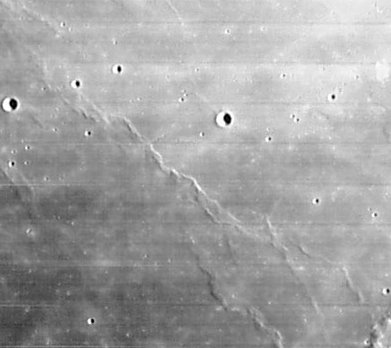Dorsa Whiston
Contents
[hide]Dorsa Whiston
|
Lat: 29.4°N, Long: 56.4°W, Length: 85 km, Height: km,Rükl: 18 |

LOIV-163-H1 The crater near the left-hand margin is Lichtenberg H, and the slightly larger one to the right of center from it is Humason. A small piece of Montes Agricola is visible in the extreme lower right corner of the frame. Dorsa Whiston is the ridge system that starts east of Lichtenberg H and runs towards Montes Agricola, forking just at the end. To the left (west) of the fork is the northern part of Dorsa Burnet. The stub of ridge crossing the left-hand margin just below Lichtenberg H is the southern tip of Dorsum Scilla.
Images
LPOD Photo Gallery Lunar Orbiter Images
Dorsa Whiston was also photographed during the mission of Apollo 15, on color Hasselblad film, see AS15-97-13264 and 13265. Both orbital Hasselblad frames could be stitched together to create one single overview of the dorsa.
Research: Danny Caes
Maps
(LAC zone 38B1) LAC map Geologic map LM map LTO map
Description
Description: Wikipedia
Additional Information
Nomenclature
- Named for William Whiston (December 9, 1667 - August 22, 1752), an English theologian, historian, astronomer and mathematician. He was an early advocate, along with Edmond Halley, of the periodicity of comets; he also held that comets were responsible for past catastrophes in earth's history. In 1701 he resigned his vicarship to become deputy at Cambridge to Sir Isaac Newton, whom two years later he succeeded as Lucasian professor of mathematics.
- Dorsa Whiston was among 120 names approved by the IAU in 1976 "as assigned" on the NASA LTO charts (IAU Transactions XVIB).
LPOD Articles
Bibliography